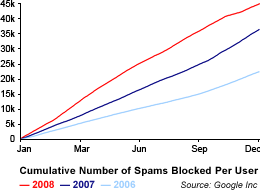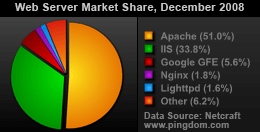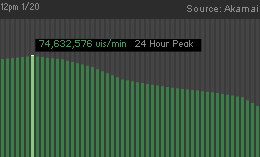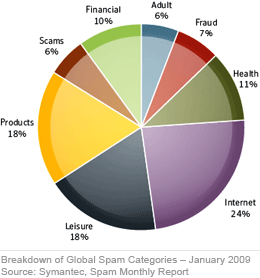

 Patrick Neighly reports on CommsDay about the Pacific Telecommunications Council 2009 Conference held last week where Vint Cerf was a keynote speaker. From the report: "Historians will view 2009 as a turning point in Internet history, according to Google internet evangelist Vint Cerf. Speaking to PTC'09 attendees, the legendary figure warned the industry to brace for 'significant change' and said Asia was poised to forever change the look and experience of the online landscape. The region boasts 578.5 million surfers with nearly 85% of its population still to come. That influx is likely to combine with the launch of non-Latin-character addresses to reshape the Web into a very different beast." more
Patrick Neighly reports on CommsDay about the Pacific Telecommunications Council 2009 Conference held last week where Vint Cerf was a keynote speaker. From the report: "Historians will view 2009 as a turning point in Internet history, according to Google internet evangelist Vint Cerf. Speaking to PTC'09 attendees, the legendary figure warned the industry to brace for 'significant change' and said Asia was poised to forever change the look and experience of the online landscape. The region boasts 578.5 million surfers with nearly 85% of its population still to come. That influx is likely to combine with the launch of non-Latin-character addresses to reshape the Web into a very different beast." more
 While the news will not be terribly surprising to CircleID readers, Google's latest report on the status of spam and 2009 predictions posted today, might be of particular interest due to the company's shear email processing volume at 2 billion enterprise email connections per day (drawn from company owned Postini Message Security network)... more
While the news will not be terribly surprising to CircleID readers, Google's latest report on the status of spam and 2009 predictions posted today, might be of particular interest due to the company's shear email processing volume at 2 billion enterprise email connections per day (drawn from company owned Postini Message Security network)... more
Last week the German IPv6 Council initiated a contest for new ideas related to IPv6 where the council invited submissions of applications which are based on the new internet protocol. The council hopes the contest will be a helpful step towards an efficient and large deployment of IPv6. The IPv6 Council, founded in late 2007 in Potsdam, will award prices of up to 10,000 Euros to the best developers' ideas for concepts, applications, and implementations. The winners will be announced and receive their awards at the 2nd German IPv6 Summit on May 14th, 2009 in Potsdam. more
ICM Registry (proponents of the .xxx initiative) and Stuart Lawley, Chairman and President of the organization, have filed a 522-page brief in the ongoing Independent Review Process that began last June. "In what may prove to be the biggest sleeper Internet governance issue of the year, ICM Registry has publicly posted its filings for the Independent Review Panel that will decide whether ICANN acted improperly in rejecting its application for a .xxx domain," writes Brenden Kuerbis in a post on the IGP blog. more
Network Solutions is having problems with "all" its name servers, according to their tech support and a recent post on North American Network Operators' Group (NANOG) mailing list indicates that it has been under very large-scale UDP/53 DDoS attack for the last 48 hour period. As a result, domain names hosted with Network Solutions' Worldnic have been affected. Network Solutions is one of the leading domain registrars and DNS hosting providers in the world, managing more than 7.6 million domain names. more
 In a blog post today, Royal Pingdom has posted a variety of statistical answers to questions for 2008 such as: How many websites were added? (A: 31.5 million) How many emails were sent? (A: 210 billion per day) How many blog posts were published? (A: 329 million) Other numbers include total number of Internet users in the world which, according to June 2008 data, is recorded at 1,463,632,361 with Asia having the highest percentage of users (39.5%) followed by Europe as the second largest (26.3%) and North America as the third (17%). Numbers have been gathered using a wide variety of sources from around the Web. more
In a blog post today, Royal Pingdom has posted a variety of statistical answers to questions for 2008 such as: How many websites were added? (A: 31.5 million) How many emails were sent? (A: 210 billion per day) How many blog posts were published? (A: 329 million) Other numbers include total number of Internet users in the world which, according to June 2008 data, is recorded at 1,463,632,361 with Asia having the highest percentage of users (39.5%) followed by Europe as the second largest (26.3%) and North America as the third (17%). Numbers have been gathered using a wide variety of sources from around the Web. more
 Web traffic delivery surged to record levels during President Barack Obama's inauguration yesterday, according to content delivery network provider, Akamai. As the largest day ever for the delivery of concurrent live streaming over Akamai's global servers, the company reported it delivered a peak of over 7 million active simultaneous streams (the majority being live streams) at approximately 12:15 p.m. ET on Tuesday, January 20, 2009. Typical simultaneous streams on an average day are less than 1 million. more
Web traffic delivery surged to record levels during President Barack Obama's inauguration yesterday, according to content delivery network provider, Akamai. As the largest day ever for the delivery of concurrent live streaming over Akamai's global servers, the company reported it delivered a peak of over 7 million active simultaneous streams (the majority being live streams) at approximately 12:15 p.m. ET on Tuesday, January 20, 2009. Typical simultaneous streams on an average day are less than 1 million. more
Continued exploitation of the financial crisis to scam users with fake financial transactions services, fake investment firms, and fake legal services is the top trend to emerge for 2009 according threat predictions by McAfee. "Computer users face a dangerous one-two punch today," said Jeff Green, senior vice president of McAfee Avert Labs, McAfee's research group. "The current economic crisis is delivering a blow to our financial well-being, while malware authors are taking advantage of our distraction to deliver a roundhouse strike." more
Amidst all the recent reports of data breaches, Gunter Ollmann of IBM Internet Security Systems, has reported today about one particular case which may be the largest data breach to date. Ollmann wirtes: "The media has been full of analysis concerning data breaches over the last couple of weeks, mostly related to the uptick in 2008 reports. While much of this increase can be accounted for by the wider adoption of state legislation that mandates companies to publicly disclose their data breaches, I think it is worth pointing out today's latest disclosure -- which is quite probably the largest breach ever." more
Recent statistics from the Bureau of Labor Statistics' Consumer Expenditure Survey has shown that American have been increasingly spending on mobile phones from 2001 through 2007. BLS data indicates cellular phone expenditures surpassed spending on residential landline phone services beginning in 2007. From the report: "In 2001, the ratio of spending on residential phone services to spending on cellular phone services was greater than 3 to 1. In 2007, cellular phone expenditures accounted for 55 percent of total telephone expenditures compared to 43 percent for residential phone expenditures. The distribution of telephone service expenditures between residential telephone/pay phone services and cellular phone services changed significantly in all age groups since 2001." more
Security researchers have identified a new phishing attack method designed to trick users into surrendering confidential information after they have logged on to an online banking, brokerage, or other sensitive website. The technique, called In Session Phishing, can be used to inject into all major browsers legitimate looking Pop Up messages using malicious JavaScript that request passwords, account numbers, etc., on behalf of the trusted website. more
 In his last meeting today, Federal Communication Commission (FCC) chairman Kevin J. Martin, announced that he will be leaving the commission and will not be staying in the Obama administration. While the chairman had previously declined commenting on his future plans, the departure did not come unexpected. In the statement after announcing his departure at the FCC meeting, Martin also mentioned that he would depart Jan. 20 to become a Senior Fellow at the Aspen Institute in Washington, D.C. This announcement follows reports that President-elect Barack Obama will nominate Julius Genachowski to be the next FCC chairman. more
In his last meeting today, Federal Communication Commission (FCC) chairman Kevin J. Martin, announced that he will be leaving the commission and will not be staying in the Obama administration. While the chairman had previously declined commenting on his future plans, the departure did not come unexpected. In the statement after announcing his departure at the FCC meeting, Martin also mentioned that he would depart Jan. 20 to become a Senior Fellow at the Aspen Institute in Washington, D.C. This announcement follows reports that President-elect Barack Obama will nominate Julius Genachowski to be the next FCC chairman. more
Comcast has sketched out plans for a gigantic database called "TV Warehouse," able to store a full year of statistics gathered from digital set-tops in more than 16 million households nationwide, according to an industry executive familiar with the project. TV Warehouse, envisioned as having a massive 500 Terabytes of storage, would then feed up to a database even broader in scope operated by Canoe Ventures, the advanced-advertising venture formed by Comcast and five other large MSOs. more
 As recently reported, spam volumes indicate spam has nearly jumped back up to its pre-McColo shutdown levels. However, Symantec's The State of Spam report has also observed that in recent days spammers are increasingly piggybacking on legitimate newsletters and using the reputation of major social networking sites to try and deliver spam messages into recipients' inboxes... In its special URL investigation the report also indicates that on average approximately 90 percent of all spam messages today contain some kind of a URL. Additionally, analysis of data from past recent days, according to Symantec, have shown that 68% of all URLs in spam messages had a '.com' Top-Level Domain (TLD), 18% had a China's '.cn' ccTLD and 5% had a '.net'. more
As recently reported, spam volumes indicate spam has nearly jumped back up to its pre-McColo shutdown levels. However, Symantec's The State of Spam report has also observed that in recent days spammers are increasingly piggybacking on legitimate newsletters and using the reputation of major social networking sites to try and deliver spam messages into recipients' inboxes... In its special URL investigation the report also indicates that on average approximately 90 percent of all spam messages today contain some kind of a URL. Additionally, analysis of data from past recent days, according to Symantec, have shown that 68% of all URLs in spam messages had a '.com' Top-Level Domain (TLD), 18% had a China's '.cn' ccTLD and 5% had a '.net'. more
 While Google admits that offering its services over IPv6 is still in its infancy, the company today announced the option for accessing Google services over IPv6. Last year, Google started offering Google search over IPv6 on IPv6-only websites like 'ipv6.google.com' requiring IPv6 connection, but other Google products have not been generally available over IPv6, says Google. "That's why we created Google over IPv6." more
While Google admits that offering its services over IPv6 is still in its infancy, the company today announced the option for accessing Google services over IPv6. Last year, Google started offering Google search over IPv6 on IPv6-only websites like 'ipv6.google.com' requiring IPv6 connection, but other Google products have not been generally available over IPv6, says Google. "That's why we created Google over IPv6." more
Sponsored byCSC

Sponsored byRadix

Sponsored byVerisign

Sponsored byVerisign

Sponsored byDNIB.com

Sponsored byWhoisXML API

Sponsored byIPv4.Global
